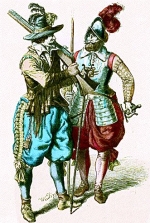|
Since joining forces with John George, the Elector of Saxony; Albert of Wallenstein has come to a realization. It is a realization more commonly reached by privates than generals in time of war - there are people on the other side who want to kill him.
To Wallenstein's logical mind the solution is simple - he must have an army that is larger than those of his enemies. Since Saxony is a relatively poor province this presents problems. In the past Wally has been able to raise vast armies by using his estates as collateral; gambling that he will seize booty or be reimbursed by his master to repay his borrowings. With his estates now behind Imperial lines his credit is not good.
Surprisingly, it is English mercenaries in John George's army that give Wally an idea. He notices that some of them have ideas of 'taking from the rich and giving to the poor'. This contrasts with their more level-headed German comrades who simply practice looting from whomever and keeping. Or 'foraging' as it is called.
These eccentric English soldiers call themselves Levelers. Only there seems to be two kinds, due to the unusual political arrangements in the England of 1635.
As near as Wallenstein can tell, it was the decision by King Charles to invite a Scottish army into England three years earlier to re-establish the Church of England that triggered the English civil war. Not that many English fought on the King's side. The King had already alienated the Commons and the Independents. By inviting in the Scots to establish Presbyterianism he had alienated the Bishops and the rest of the Lords. After the King and his eldest son had fallen in the rout of the Scots at the battle of St Albans, the war had been effectively over. The Queen and her youngest son were safely in Spain. A coalition between the Church and the Levelers dominated the Council of Regency. Not that James, the new heir-presumptive, was likely to be crowned any time soon owing to English misgivings about the education he was receiving at the hands of the Dominicans in Madrid.
But one group of Levelers was unhappy with this result. They were republicans, 'Democratic Levelers' they called themselves, and they had no truck with the Council of Regency. It was the Democratic Levelers who formed the bulk of the English mercenaries in Saxony. In fact, one of the finest English generals of the Civil War, the victor of the Battle of St Albans, was amongst their number.
Wallenstein had taken his idea to John George for prior approval. Wally knew he was not entirely trusted, so it was best to keep everything out in the open with his new master who had, after all, power of life and death over him.
"Your Majesty, I propose to give your army, in lieu of pay for ten years, Austria."
"Hang on Albert," the Elector said, "can you do that? I mean, I stood aloof when Frederick seized Bohemia from Ferdinand because Ferdinand was the rightful ruler. I've only joined the war on the Protestant side because Saxony was invaded. I can't hardly approve of Ferdinand being deprived of Austria."
"Your principles are a byword throughout Christendom, your highness. Yet Ferdinand means to establish Hapsburg absolutism throughout the Empire. If you fail to oppose him successfully you will become at best a vassal; at worst, dispossessed, like Frederick. Yet you can't oppose him successfully without a strong army at your command." Wally smiled inwardly. He had said 'your command' but meant 'my command'. And it would not just be the army that would be his. Wally's new policy of keeping everything out in the open did not mean everything.
Out loud, Wallenstein continued, "And the only way you can afford a strong army, your highness, is to offer Austria. It's either you or Ferdinand. In the end, there can only be one."
John George[1] was still puzzled. "But this whole war was about Bohemia. Why turn it into a fight over Austria?"
"Your highness, your soldiers whether Saxon or mercenary are for the most part Protestant. Bohemia was once substantially Protestant but has been cleared these last seventeen years. Many of these Protestants have fled to the friendlier Austria. Austria is the last, best hope of a Protestant southern Europe." Austria is also more central, more strategic than Bohemia, Wally thought. Just let me have a little parcel of land, the Brenner Pass. The tolls I could charge there!
"But will men fight without pay?" the Elector wanted to know.
"Men will do great things for honor, your majesty. They will still be given rations. But they will fight for a hope, the hope that one day every man of them will be a knight or better."
John George agreed, although not without misgivings. These misgivings became more profound three days later when he heard that Wallenstein's words "every man of them will be a knight or better" had been simplified into the password "Every man an elector!" This was taking liberties, in a very real sense of the word 'liberty'. But what could the Elector do? He couldn't disband his army. He had a tiger by the tail and couldn't let go.
| 
